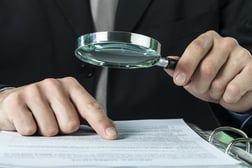Sales Tax Scaries 4: Nexus and Taxability
When Sales Tax Creeps Up on You
Ever notice how the first characters in every horror movie never...

 An exemption certificate is used to exempt an otherwise taxable transaction from sales tax. The most common exemption certificate is a resale exemption certificate (aka a resale certificate). In the absence of a valid resale certificate, an auditor is likely to assume the transaction was taxable. As a result, it’s critical for the seller to maintain copies of these resale certificates in the event of an audit.
An exemption certificate is used to exempt an otherwise taxable transaction from sales tax. The most common exemption certificate is a resale exemption certificate (aka a resale certificate). In the absence of a valid resale certificate, an auditor is likely to assume the transaction was taxable. As a result, it’s critical for the seller to maintain copies of these resale certificates in the event of an audit.
The overall concept is that sales tax is imposed on the end-user of an item. It is presumed that all sales of tangible personal property are taxable unless specifically enumerated. But exemptions apply to scenarios where the product, service, or transaction is otherwise subject to sales and use tax but for which there is now a legislated exemption. The most common is a resale exemption, where an item is purchased with the intent to sell the same item to another consumer or business.
Let’s say you go to Walmart to buy an item. Walmart charges you sales tax at the point of sale. When Walmart purchased that inventory, it did not pay sales tax on it. They purchased the item for resale and likely provided a resale exemption certificate to their vendor.
If you are receiving a resale certificate from one of your customers, the resale certificate typically includes the buyer’s sales tax ID, a date, a signature, and the reason for claiming the exemption. Depending on the state, additional information may also be required. Some certificates are valid for a set number of years; others never expire.
Also note that if someone buys from you, and they claim the item is for resale, you must exercise “good faith” in accepting the exemption certificate. This includes reviewing the certificate for completeness including the necessary items reference above.
Among different types of resale certificates, a Uniform Sales and Use Tax Certificate can be used for resale exemptions in many states, with some limitations; the Streamlined sales tax form works in states that participate in the Streamlined Sales Tax project; and individual states issue-specific resale certificates and sometimes allow client-created certificates.
If you buy tangible personal property for resale and are audited, one of the first requests from the auditor will be for you to provide copies of all exemption certificates, including resale certificates. A few missing certificates on your end can result in large assessments including penalties and interest.
Exemption and resales certificates are just a portion of your responsibilities when it comes to sales tax obligations and compliance. With TaxConnex, we manage this for you. Contact us to find out if your business could be impacted by resale and exemption certificates and to gain a better understanding of your burden of sales tax compliance.

Ever notice how the first characters in every horror movie never...
Copyright © 2025 TaxConnex, LLC